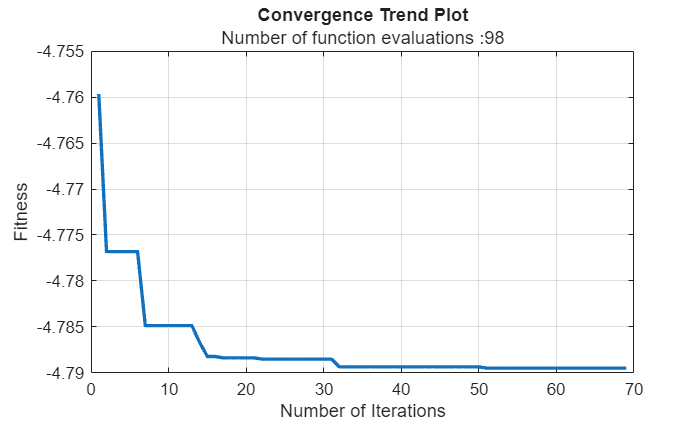showConvergenceTrend
Description
Examples
Create a dipole antenna resonating at 75 MHz and calculate its maximum directivity.
Choose its length and width as design variables. Provide lower and upper bounds of length and width.
referenceAnt = design(dipole,75e6); InitialDirectivity = max(max(pattern(referenceAnt,75e6)))
InitialDirectivity = 2.1002
Bounds = [3 0.11; 7 0.13];
Use the SADEA optimizer to optimize this dipole antenna for its directivity. Specify an evaluation function for optimization using the CustomEvaluationFunction property of the OptimizerSADEA object. The evaluation function used in this example is defined at the end of this example.
s = OptimizerSADEA(Bounds); s.CustomEvaluationFunction = @customEvaluationOnlyObjective;
Run the optimization for 100 iterations.
figure s.optimizeWithPlots(100);

View the best member data.
bestDesign = s.getBestMemberData
bestDesign =
bestMemberData with properties:
member: [4.7998 0.1101]
performances: -4.7895
fitness: -4.7895
bestIterationId: 50
bestdesignValues = bestDesign.member
bestdesignValues = 1×2
4.7998 0.1101
Update the reference antenna with best design values from the optimizer. Calculate directivity of the optimized design.
Observe an increase in directivity value after optimization.
referenceAnt.Length = bestdesignValues(1); referenceAnt.Width = bestdesignValues(2); postOptimizationDirectivity = max(max(pattern(referenceAnt,75e6)))
postOptimizationDirectivity = 4.7895
View the surrogate model data used for prediction.
InitialData = s.getInitializationData
InitialData =
initializationData with properties:
members: [30×2 double]
performances: [30×1 double]
fitness: [30×1 double]
View the data for all iterations.
iterData = s.getIterationData
iterData =
iterationData with properties:
members: [68×2 double]
performances: [68×1 double]
fitness: [68×1 double]
Check if the algorithm has converged.
ConvergenceFlag = s.isConverged
ConvergenceFlag = logical
1
Check how many times the evaluation function is computed.
NumEvaluations = s.getNumberOfEvaluations
NumEvaluations = 98
Plot the convergence trend.
s.showConvergenceTrend

Following code defines the evaluation function used in this example.
function fitness = customEvaluationOnlyObjective(designVariables) fitness = []; try % Create geometry ant = design(dipole,75e6); ant.Length = designVariables(1); ant.Width = designVariables(2); catch % Handle errors during geometry creation. % High penalty value is used to handle errors. fitness = 1e6; end if isempty(fitness) try % Calculate directivity % Optimizer always minimizes the objective hence reverse the sign to maximize gain. objective = max(max(pattern(ant,75e6))); objective = -objective; catch % Handle errors during gain computation. % High penalty value is used to handle errors. objective = 1e6; end % As there are no constraints, fitness equals objective. fitness = objective; end end
Input Arguments
Optimizer, specified as an OptimizerSADEA or OptimizerTRSADEA object. The function plots the convergence trend associated
with the optimizer object specified in obj.
Example: OptimizerSADEA
Version History
Introduced in R2025a
See Also
Objects
MATLAB Command
You clicked a link that corresponds to this MATLAB command:
Run the command by entering it in the MATLAB Command Window. Web browsers do not support MATLAB commands.
选择网站
选择网站以获取翻译的可用内容,以及查看当地活动和优惠。根据您的位置,我们建议您选择:。
您也可以从以下列表中选择网站:
如何获得最佳网站性能
选择中国网站(中文或英文)以获得最佳网站性能。其他 MathWorks 国家/地区网站并未针对您所在位置的访问进行优化。
美洲
- América Latina (Español)
- Canada (English)
- United States (English)
欧洲
- Belgium (English)
- Denmark (English)
- Deutschland (Deutsch)
- España (Español)
- Finland (English)
- France (Français)
- Ireland (English)
- Italia (Italiano)
- Luxembourg (English)
- Netherlands (English)
- Norway (English)
- Österreich (Deutsch)
- Portugal (English)
- Sweden (English)
- Switzerland
- United Kingdom (English)